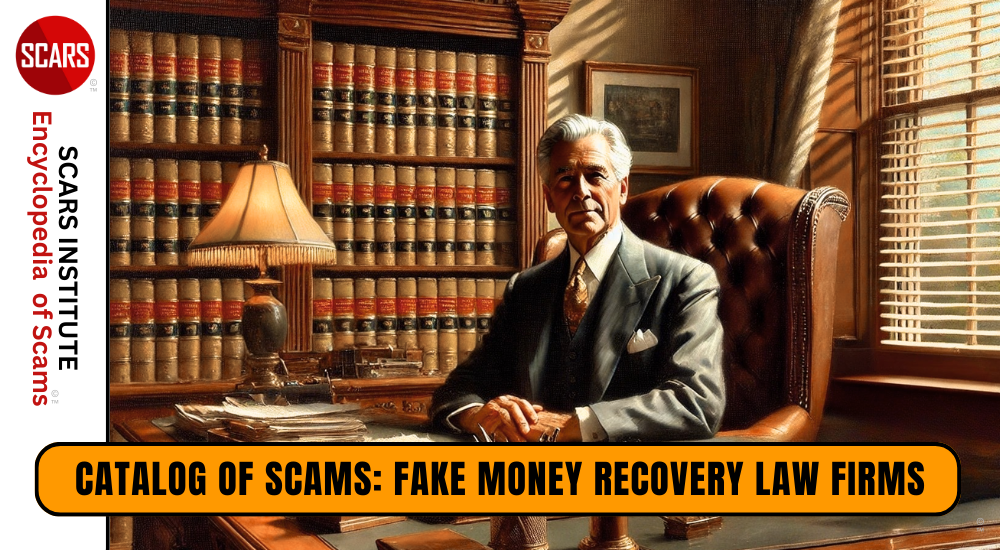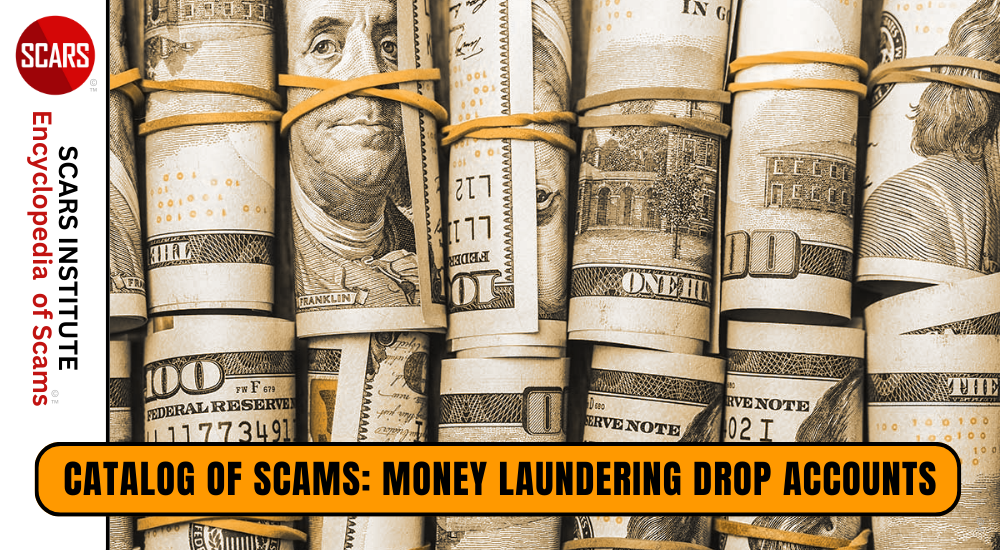
SCARS Institute’s Encyclopedia of Scams™ Published Continuously for 25 Years

Reprinted from Slate »
The Spanish Prisoner, the Treasure-Dangling Scam That Won’t Die
“A man in this country receives a letter from a foreign city,” reads a New York Times trend story from 1898, about a “common” scam being carried out by mail.
Titled “AN OLD SWINDLE REVIVED”, the story details how the “Spanish Prisoner” scam generally begins:
“The writer is always in jail because of some political offense. He always has some large sum of money hid, and is invariably anxious that it should be recovered and used to take care of his young and helpless daughter by some honest man. He knows of the prudence and good character of the recipient of the letter through a mutual friend, whom he does not mention for reasons of caution, and appeals to him in time of extremity for help.”
Postal shakedowns were a simple, and sometimes effective, way of illicitly separating rich people from their money in the 19th century. What was in it for the good Samaritan, just opening his mail on a boring day? Well, the sender of the letter “is willing to give one-third of the concealed fortune to the man who will recover it,” according to the Times.
What happens next is the ask: Before the treasure can be recovered, the writer just needs some money sent to him first. (The treasure, of course, never materializes.)
Sound familiar? The so-called “Spanish Prisoner” scam is still around: Just this week, a top Nigerian fraud artist was arrested for his part in carrying out similar swindles via email. And the 1898 Times description of the scam’s broad outlines remains remarkably accurate, save for a few technological details.
The swindle came to be known as the “Spanish Prisoner” because, often, the letter writer claimed to be holed up in a Spanish jail, for reasons arising from the Spanish-American War. “The letter is written on thin, blue, cross-lined paper, such as is used for foreign letters, and is written as fairly well-educated foreigners write English, with a word misspelled here and there, and an occasional foreign idiom,” the 118-year-old Times story notes.
Modern readers, though, are likely more familiar with its more modern variant: official-looking emails from Nigeria, which ask the recipient to send money—often thousands of dollars—to unlock a massive treasure, which has been tied up by government officials or otherwise encumbered in some abstruse way.
As in 1898, these entreaties at first blush might seem real but upon closer inspection hardly hold up. The English is a little broken, and the “official” seal of some Nigerian government agency doesn’t seem quite right. There’s an air of too much desperation.
And, yet, still, people fall for it, since the conceit of the scam isn’t that it will work every time, or even one out of a hundred times. You only need a few suckers, in other words, to make millions.
One victim in the U.S. lost $5.6 million to scammers.
The recently arrested Nigerian Spam Kingpin was said to have hauled in around $60 million in ill-gotten gains.
But even in the days when you had to hand-write letters the scam was astonishingly successful. Eugène François Vidocq, who is called the father of criminology, documented in his memoirs a version of it perpetrated by prisoners in early 19th-century France. This was well before the Spanish-American War, when the scheme was then known as “letters from Jerusalem.”
Vidocq, who, before he founded France’s civilian police corps was a criminal himself, saw firsthand the letters while he was imprisoned in a jail in Bicètre, in rural France.
“Sir,—You will doubtlessly be astonished at receiving a letter from a person unknown to you,” one such letter began, according to Vidocq’s recollection. The structure of this letter is savvy. Before unleashing his tale of woe, the writer offers the carrot first: a casket containing 16,000 francs in gold as well as diamonds, which the writer says he and his master were forced to leave behind after they were detained while traveling. Having laid out the stakes, he continues, writing of his eventual supposed imprisonment, before, finally, they ask, which in this case is very subtle: “I beg to know if I cannot, through your aid, obtain the casket in question and get a portion of the money which it contains. I could then supply my immediate necessities and pay my counsel, who dictates this and assures me that by some presents, I could extricate myself from this affair.”
Vidocq wrote that 20 percent of such letters received some kind of reply, and, in some cases, prisoners made hundreds of francs from the letters, which were tacitly allowed by jailers, who would also take a cut.
Fast forward nearly 200 years to the 1980s, when scammers in Nigeria began to send reams of paper letters to people across the world. By the 1990s, they used fax machines and, by the late 1990s, had switched to email.
In the most recent case, a man known only as “Mike,” was arrested, according to the BBC. Over the years, Mike oversaw dozens of people who sent an untold number of emails out across the world, from the U.S. to India to Romania, using the digital age to realize the full potential of the swindle.
PLEASE SHARE OUR ARTICLES WITH YOUR FRIENDS & FAMILY
HELP OTHERS STAY SAFE ONLINE – YOUR KNOWLEDGE CAN MAKE THE DIFFERENCE!
THE NEXT VICTIM MIGHT BE YOUR OWN FAMILY MEMBER OR BEST FRIEND!
By the SCARS™ Editorial Team
Society of Citizens Against Relationship Scams Inc.
A Worldwide Crime Victims Assistance & Crime Prevention Nonprofit Organization Headquartered In Miami Florida USA & Monterrey NL Mexico, with Partners In More Than 60 Countries
To Learn More, Volunteer, or Donate Visit: www.AgainstScams.org
Contact Us: Contact@AgainstScams.org
-/ 30 /-
What do you think about this?
Please share your thoughts in a comment below!
Table of Contents
- The Spanish Prisoner is a confidence trick originating by at least the early 19th century, as Eugène François Vidocq described in his memoirs
- How Scams Work
- Titled “AN OLD SWINDLE REVIVED”, the story details how the “Spanish Prisoner” scam generally begins:
- One victim in the U.S. lost $5.6 million to scammers.
- PLEASE SHARE OUR ARTICLES WITH YOUR FRIENDS & FAMILY
- By the SCARS™ Editorial Team
Society of Citizens Against Relationship Scams Inc. - The Issue Of Race In Scam Reporting
Click Here To Learn More!
LEAVE A COMMENT?
Thank you for your comment. You may receive an email to follow up. We never share your data with marketers.
Recent Comments
On Other Articles
- on Finally Tax Relief for American Scam Victims is on the Horizon – 2026: “I just did my taxes for 2025 my tax account said so far for romances scam we cd not take…” Feb 25, 19:50
- on Reporting Scams & Interacting With The Police – A Scam Victim’s Checklist [VIDEO]: “Yes, this is a scam. For your own sanity, just block them completely.” Feb 25, 15:37
- on Danielle Delaunay/Danielle Genevieve – Stolen Identity/Stolen Photos – Impersonation Victim UPDATED 2024: “She goes by the name of Sanrda John now” Feb 25, 10:26
- on Reporting Scams & Interacting With The Police – A Scam Victim’s Checklist [VIDEO]: “So far I have not been scam out of any money because I was aware not to give the money…” Feb 25, 07:46
- on Love Bombing And How Romance Scam Victims Are Forced To Feel: “I was love bombed to the point that I would do just about anything for the scammer(s). I was told…” Feb 11, 14:24
- on Dani Daniels (Kira Lee Orsag): Another Scammer’s Favorite: “You provide a valuable service! I wish more people knew about it!” Feb 10, 15:05
- on Danielle Delaunay/Danielle Genevieve – Stolen Identity/Stolen Photos – Impersonation Victim UPDATED 2024: “We highly recommend that you simply turn away form the scam and scammers, and focus on the development of a…” Feb 4, 19:47
- on The Art Of Deception: The Fundamental Principals Of Successful Deceptions – 2024: “I experienced many of the deceptive tactics that romance scammers use. I was told various stories of hardship and why…” Feb 4, 15:27
- on Danielle Delaunay/Danielle Genevieve – Stolen Identity/Stolen Photos – Impersonation Victim UPDATED 2024: “Yes, I’m in that exact situation also. “Danielle” has seriously scammed me for 3 years now. “She” (he) doesn’t know…” Feb 4, 14:58
- on An Essay on Justice and Money Recovery – 2026: “you are so right I accidentally clicked on online justice I signed an agreement for 12k upfront but cd only…” Feb 3, 08:16
ARTICLE META
Important Information for New Scam Victims
- Please visit www.ScamVictimsSupport.org – a SCARS Website for New Scam Victims & Sextortion Victims
- Enroll in FREE SCARS Scam Survivor’s School now at www.SCARSeducation.org
- Please visit www.ScamPsychology.org – to more fully understand the psychological concepts involved in scams and scam victim recovery
If you are looking for local trauma counselors please visit counseling.AgainstScams.org or join SCARS for our counseling/therapy benefit: membership.AgainstScams.org
If you need to speak with someone now, you can dial 988 or find phone numbers for crisis hotlines all around the world here: www.opencounseling.com/suicide-hotlines
A Note About Labeling!
We often use the term ‘scam victim’ in our articles, but this is a convenience to help those searching for information in search engines like Google. It is just a convenience and has no deeper meaning. If you have come through such an experience, YOU are a Survivor! It was not your fault. You are not alone! Axios!
A Question of Trust
At the SCARS Institute, we invite you to do your own research on the topics we speak about and publish, Our team investigates the subject being discussed, especially when it comes to understanding the scam victims-survivors experience. You can do Google searches but in many cases, you will have to wade through scientific papers and studies. However, remember that biases and perspectives matter and influence the outcome. Regardless, we encourage you to explore these topics as thoroughly as you can for your own awareness.
Statement About Victim Blaming
SCARS Institute articles examine different aspects of the scam victim experience, as well as those who may have been secondary victims. This work focuses on understanding victimization through the science of victimology, including common psychological and behavioral responses. The purpose is to help victims and survivors understand why these crimes occurred, reduce shame and self-blame, strengthen recovery programs and victim opportunities, and lower the risk of future victimization.
At times, these discussions may sound uncomfortable, overwhelming, or may be mistaken for blame. They are not. Scam victims are never blamed. Our goal is to explain the mechanisms of deception and the human responses that scammers exploit, and the processes that occur after the scam ends, so victims can better understand what happened to them and why it felt convincing at the time, and what the path looks like going forward.
Articles that address the psychology, neurology, physiology, and other characteristics of scams and the victim experience recognize that all people share cognitive and emotional traits that can be manipulated under the right conditions. These characteristics are not flaws. They are normal human functions that criminals deliberately exploit. Victims typically have little awareness of these mechanisms while a scam is unfolding and a very limited ability to control them. Awareness often comes only after the harm has occurred.
By explaining these processes, these articles help victims make sense of their experiences, understand common post-scam reactions, and identify ways to protect themselves moving forward. This knowledge supports recovery by replacing confusion and self-blame with clarity, context, and self-compassion.
Additional educational material on these topics is available at ScamPsychology.org – ScamsNOW.com and other SCARS Institute websites.
Psychology Disclaimer:
All articles about psychology and the human brain on this website are for information & education only
The information provided in this article is intended for educational and self-help purposes only and should not be construed as a substitute for professional therapy or counseling.
While any self-help techniques outlined herein may be beneficial for scam victims seeking to recover from their experience and move towards recovery, it is important to consult with a qualified mental health professional before initiating any course of action. Each individual’s experience and needs are unique, and what works for one person may not be suitable for another.
Additionally, any approach may not be appropriate for individuals with certain pre-existing mental health conditions or trauma histories. It is advisable to seek guidance from a licensed therapist or counselor who can provide personalized support, guidance, and treatment tailored to your specific needs.
If you are experiencing significant distress or emotional difficulties related to a scam or other traumatic event, please consult your doctor or mental health provider for appropriate care and support.
Also read our SCARS Institute Statement about Professional Care for Scam Victims – click here to go to our ScamsNOW.com website.



















The first fraud I experienced in 2024, the final press for assistance, was in a slightly similar version of the Spanish Prisoner Scam. Amazing. In my crime the “celebrity” was frozen out of “their” assets and needed a briefcase that “they” had sent overseas containing the documents “they” needed to prove to the courts that “their” spouse, attorney and management team were all in collusion against “them”. (Now why would anyone send those particular documents overseas?) When questioned about that the criminal had had suspicions that his important people were doing this and “they” wanted to be certain that the documentation was in a safe place. The criminal wanted me to forward $10,000 to a shipping company (which turned out to be in Istanbul, Turkey). I was introduced to the shipping company contact as “their” personal assistant. Besides the documents in the briefcase there was currency and jewelry totaling over $800,000 and that I would receive 30% of the contents for my assistance. The 2nd scam that originated approximately 3 weeks after I ended the first was more intense in love bombing, and keeping my emotions in hypersensitivity. It was intensely emotional and overwhelming.
One of my romance scammers had a similar story. She inherited 12 million on gold & diamonds but needed money for a variety of reasons to retrieve the estate. She even sent pictures of documents and a video of the gold & diamonds being held by the security company.